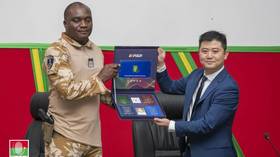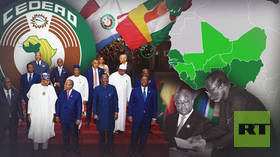Sahel state snubs regional bloc with passport move

Burkina Faso has issued new biometric passports that do not feature the Economic Community of West African States (ECOWAS) logo on their covers amid a dispute with the 50-year-old regional political and economic union.
At the launch on Tuesday, Burkinabe Security Minister Mahamadou Sana said the removal of the ECOWAS symbol and “no mention of ECOWAS either” on the passports was a result of Ouagadougou’s decision to quit the bloc.
According to Perfect Loure, director-general of the landlocked state’s National Identification Office, the travel documents were designed by Chinese company EmpTech.
In January, Burkina Faso, Niger, and Mali, which had formed the Alliance of Sahel States (AES) with a commitment to defend each other from security threats, jointly announced that they were leaving the 15-nation regional grouping. The three allies accused ECOWAS of posing a threat to their sovereignty by serving as a tool for foreign powers after the bloc, backed by France, threatened to invade Niger to restore democratic order following the ouster of Nigerien President Mohamed Bazoum in July 2023.
The former French colonies, which have all severed defense ties with Paris, criticized ECOWAS for imposing “illegal” and “inhumane” sanctions in response to coups in their respective countries. They have also accused the authority of failing to assist them in combating jihadist violence, which has persisted in the Sahel region for a decade, which they have used as justification for deposing their civilian governments.
ECOWAS denies the allegations and has since sought to convince Bamako, Niamey, and Ouagadougou to reconsider their decision, warning that their breakaway would undermine free trade and movement within the region.
In July, ECOWAS appointed Senegalese President Bassirou Diomaye Faye to initiate talks with the Sahel leaders in a bid to resolve the impasse and restore regional stability. It lifted economic and travel sanctions against Niger, Mali, and Burkina Faso in February.
The three military rulers have ruled out returning to the West African economic bloc. In May, Nigerien Prime Minister Ali Mahaman Lamine Zeine invited ECOWAS members to join the Alliance for Sahel States, which he says promotes a “culture of sovereignty and dignity.”













